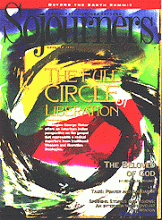When a church, the very institution that is mandated to teach, preach, and heal in the name of Jesus Christ, becomes an agent of destruction of the minds, hearts, spirits, and relationships of its members, truly we are facing the Adversary in the clothing of the Lamb.
Certain dynamics protect the Adversary's disguise. Evil seeks darkness and confusion, and it resists exposure. The right to religious freedom in the United States is generally upheld, no matter how dysfunctional, damaging, or crazy a religious persuasion may be. And Christians hesitate to confront other Christians' religious practices, even when we strongly disagree.
Authors Father Leo Booth, Ronald Enroth, Marie Fortune, Philip Greven, and Virginia Curran Hoffman have each done an excellent job of illuminating significant aspects of spiritual sickness and abuse within some Christian churches. With remarkable courage and clarity, these authors confront what may be the gravest evil of all: using God's name as a weapon, harming the capacity of the human heart to experience God's unconditional love.
Hoffman names insidious forms of abuse in churches that are widely accepted as normal and are therefore difficult to spot. Booth, Enroth, Fortune, and Greven name more extreme abuses that are easier to see clearly, at least from the outside.
In The Codependent Church, Virginia Curran Hoffman demonstrates that the relationship between church and member is often characterized by parent-child roles. Members surrender their own authority to religious leaders and then seek approval through codependent behaviors, for example, conforming outwardly and disagreeing in silence. Codependence with a church causes suffering for members themselves and causes them to victimize others as well.
Read the Full Article

